
African Review of Economics and Finance-AREF
Scope & Guideline
Connecting Scholars to Transform African Economies
Introduction
Aims and Scopes
- Economic Development and Policy Analysis:
AREF publishes research that investigates economic growth, development strategies, and the effectiveness of policies in African nations, with a focus on empirical analysis. - Financial Systems and Market Dynamics:
The journal explores the structure and performance of financial markets in Africa, including banking, investment, and capital markets, utilizing quantitative methodologies. - Socio-Economic Issues and Inclusivity:
Research on social issues, such as inequality, poverty, and access to essential services, is a core area, emphasizing inclusive growth and the impact of socio-economic factors. - Innovation and Technology in Economic Growth:
AREF highlights studies on innovation, technology adoption, and their roles in enhancing firm performance and economic resilience in African contexts. - Crisis and Risk Management:
The journal addresses economic crises, such as those induced by pandemics or financial shocks, focusing on risk management strategies and their implications for economic stability.
Trending and Emerging
- Impact of COVID-19 on Economies:
Research exploring the economic consequences of the COVID-19 pandemic has surged, focusing on its effects on various sectors, market dynamics, and recovery strategies. - Digital Finance and Mobile Banking:
There is an increasing focus on the role of digital finance, including mobile banking, in enhancing financial inclusion and economic growth across the continent. - Climate Change and Economic Resilience:
Emerging studies are concentrating on the intersection of climate change, risk management, and economic resilience, highlighting the urgent need for sustainable development strategies. - Foreign Direct Investment (FDI) and Economic Growth:
An uptick in research examining the relationship between FDI, human capital, and economic growth reflects a renewed interest in attracting investment as a means of driving development. - Institutional Quality and Governance:
Research on the effects of institutional quality on economic outcomes is gaining prominence, emphasizing the importance of governance and institutional frameworks in fostering economic growth.
Declining or Waning
- Traditional Economic Models:
There has been a noticeable decline in the publication of papers relying solely on traditional economic models without considering the dynamic and complex realities of African economies. - Monetary Policy Frameworks:
While still relevant, discussions centered exclusively on conventional monetary policy frameworks have decreased, possibly due to a shift towards more innovative or context-specific approaches. - Sector-Specific Studies in Isolation:
Research focusing narrowly on specific sectors (e.g., agriculture or manufacturing) without integrating broader economic contexts or interdisciplinary approaches appears to be less prevalent. - Historical Economic Analysis:
Studies that primarily focus on historical economic events without drawing contemporary relevance or implications for current policy are becoming less common, suggesting a need for more actionable research.
Similar Journals
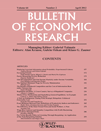
BULLETIN OF ECONOMIC RESEARCH
Exploring the Frontiers of Economic InsightBULLETIN OF ECONOMIC RESEARCH is a premier academic journal published by WILEY, dedicated to the dissemination of high-quality research in the field of economics and econometrics. Established in 1948, the journal has a rich history of contributing to the scholarly dialogue surrounding economic theory and practice, making it an essential resource for researchers, professionals, and students alike. With an impressive impact factor and ranked in the Q3 category for 2023, the journal publishes original research articles, reviews, and theoretical discussions that reflect current trends and developments in the field. Despite not being an open-access journal, it offers numerous access options through institutional subscriptions, ensuring wide dissemination of its impactful content. Aiming to foster a deeper understanding of economic issues, the BULLETIN OF ECONOMIC RESEARCH serves as a vital platform for ongoing scholarly debate and innovation in economic thought.
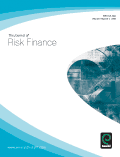
Journal of Risk Finance
Connecting theory and practice in risk finance.The Journal of Risk Finance, published by Emerald Group Publishing Ltd, is a premier academic journal dedicated to advancing the understanding of risk management and finance practices since its inception in 1999. With a strong foothold within the Q2 rankings in both Accounting and Finance categories, it proudly holds a significant place in the scholarly landscape, ranking #54 out of 317 in the Scopus Economics and Finance category, placing it in the 83rd percentile. The journal aims to facilitate the exchange of innovative research and practical insights, catering to an audience of researchers, professionals, and students eager to explore contemporary issues in risk finance. While not an open access journal, it provides numerous access options, ensuring that essential findings reach a broad readership. Set in the United Kingdom and covering publications up to 2024, the Journal of Risk Finance continues to be an indispensable resource for those committed to this critical field.
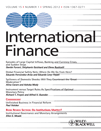
International Finance
Advancing global financial insights.International Finance is a prestigious academic journal published by WILEY, dedicated to the exploration and advancement of theories and practices in the realms of finance, development, and geography. With a strong emphasis on empirical and theoretical research, this journal provides a crucial platform for researchers, professionals, and students to disseminate cutting-edge findings that shape our understanding of the financial landscape on a global scale. Holding an impressive impact factor and categorized in the Q2 quartile across multiple disciplines, including Development, Finance, and Geography, the journal has established itself as a significant contributor to scholarly discourse. Since its inception in 1998 and spanning until 2024, International Finance offers a comprehensive overview of current trends and challenges faced in financial contexts, enhancing the decision-making processes within academia and industry alike. Although the journal is not open access, its rigorous peer-review process guarantees high-quality content that is indispensable for anyone engaged in the diverse fields intersecting with finance.
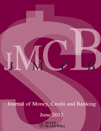
JOURNAL OF MONEY CREDIT AND BANKING
Transforming Understanding of Economic SystemsJOURNAL OF MONEY CREDIT AND BANKING, published by Wiley, stands as a premier academic outlet in the domains of finance, economics, and accounting. With an ISSN of 0022-2879 and an E-ISSN of 1538-4616, this journal serves as a vital resource for researchers seeking to explore the dynamic interactions between money, credit, and banking systems. Compiling groundbreaking research since its inception, the journal boasts an impressive Q1 quartile ranking across key categories in the 2023 metrics, reflecting its prestige in the fields of Accounting, Economics, and Finance. It ranks among the top in its class with a Scopus ranking that underscores its contribution and influence in scholarly discourse, especially in the evolving contexts of economic policy and financial markets. Although not available as an open-access publication, the journal’s commitment to high-quality peer-reviewed research makes it indispensable for professionals, students, and academicians aiming to stay abreast of developments in monetary theory and practice. With the aim of fostering scholarly exchanges, the JOURNAL OF MONEY CREDIT AND BANKING remains a cornerstone for advancing understanding and application of critical financial concepts.

JOURNAL OF FINANCIAL ECONOMICS
Exploring the intersection of finance, economics, and innovation.Welcome to the JOURNAL OF FINANCIAL ECONOMICS, a premier publication in the realms of finance, economics, and accounting, published by Elsevier Science SA in the Netherlands. With its impactful contributions since 1974, this esteemed journal has earned an impressive impact factor and consistently ranks in the Q1 category across various fields, including Accounting, Economics and Econometrics, Finance, and Strategy and Management. Researchers can access cutting-edge studies that delve into both theoretical frameworks and empirical analyses, crucial for advancing financial literacy and economic policies globally. With remarkable Scopus rankings, notably placing #2 in Accounting and #6 in Finance, the journal serves not only as a reliable resource for academics but also as a vital tool for professionals seeking to stay abreast of the latest financial trends and insights. Engage with the latest research and contribute to the dialogue shaping the future of financial economics!
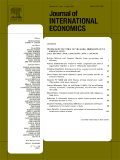
JOURNAL OF INTERNATIONAL ECONOMICS
Unveiling the complexities of global economics.JOURNAL OF INTERNATIONAL ECONOMICS, published by ELSEVIER, stands at the forefront of advancing knowledge in the fields of economics and finance. With an esteemed Q1 ranking in both Economics and Econometrics and Finance categories, this journal has established itself as a premier platform for disseminating innovative research. Since its inception in 1971, the journal has provided critical insights into the dynamics of international economic interactions, making it essential reading for researchers, professionals, and students seeking to understand complex global economic issues. With access to high-quality, peer-reviewed articles, readers can stay abreast of the latest trends, methodologies, and empirical findings shaping the economic landscape. Based in the Netherlands, the journal continues to attract contributions from leading experts worldwide, with its rigorous selection process ensuring that only the most impactful research is published, further enhancing its significance in the academic community.

Annals of Economics and Finance
Advancing Knowledge in Economics and Financial Theory.Annals of Economics and Finance is an esteemed academic journal published by Wuhan University Journals Press, focusing on the fields of Economics and Finance. Established in 2000, this journal serves as a platform for scholars to disseminate their research findings and insights, contributing to the development of these disciplines through rigorous peer-reviewed articles. Despite currently holding a Q4 ranking in both Economics and Econometrics and Finance categories (2023), it strives to enhance its impact on the academic community and policy-making audiences. While not Open Access, the journal seeks to cultivate a deeper understanding of vital economic theories and financial practices, thereby offering invaluable resources for researchers, professionals, and students alike. With its broad scope, the Annals of Economics and Finance is poised to play a crucial role in shaping contemporary economic discourse up to 2024 and beyond.

EKONOMICKY CASOPIS
Advancing Knowledge, Shaping Economic FuturesEKONOMICKY CASOPIS is a distinguished journal published by the Institute of Economics Research SAS and the Institute of Forecasting CSPS SAS, offering a comprehensive platform for the dissemination of innovative research in the field of economics and econometrics. Since its inception in 1978, the journal has been committed to fostering scholarly discourse, showcasing empirical studies, theoretical advancements, and policy analyses that contribute to the understanding of economic phenomena. Although categorized in the Q4 quartile in 2023 and ranking in the lower percentiles within Scopus, EKONOMICKY CASOPIS remains a critical resource for researchers and practitioners seeking to engage with the economic challenges of our time. As the journal continues to evolve through 2024, it invites contributions that align with its objectives of enhancing economic insights and promoting academic discussion in Slovakia and beyond. For researchers looking to publish their work or expand their knowledge, EKONOMICKY CASOPIS serves as a vital resource in the expanding landscape of economic research.

B E Journal of Macroeconomics
Connecting researchers with critical macroeconomic discourse.B E Journal of Macroeconomics is a distinguished academic journal published by WALTER DE GRUYTER GMBH that serves as a critical platform for advancing the field of macroeconomic research. Established in 2001, it has gained recognition within the economics community, featuring a broad range of theories and empirical studies relevant to contemporary economic issues. With an impact factor reflective of its academic contributions, the journal is categorized in the Q3 quartile for Economics and Econometrics, ranking 607 out of 716 in its field according to Scopus metrics. The journal's scope includes a comprehensive exploration of macroeconomic trends, policy analysis, and the dynamics of economic systems, catering to researchers, practitioners, and students alike. Though primarily published in a traditional format, researchers have ample opportunities to access its invaluable content through institutional subscriptions, ensuring the dissemination of knowledge across the global economic landscape. Located in Berlin, Germany, B E Journal of Macroeconomics not only enriches the academic discourse but also fosters a deeper understanding of macroeconomic phenomena, making it an essential resource for anyone engaged in the field.
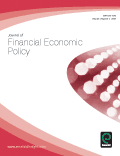
Journal of Financial Economic Policy
Driving scholarly discourse on financial policies and economic challenges.Journal of Financial Economic Policy is a premier academic journal published by EMERALD GROUP PUBLISHING LTD, focusing on the intersection of finance and economics. Through rigorous peer-reviewed research, the journal aims to advance understanding of financial policies and economic frameworks, addressing critical issues faced by financial markets and institutions. With an ISSN of 1757-6385 and an E-ISSN of 1757-6393, it serves as a reputable source of information for researchers, professionals, and students alike. The journal operates within the United Kingdom and is recognized for its contributions to the fields of economics and finance, achieving a Q3 category ranking in both disciplines as per the 2023 metrics. This places it within the top half of journals in its category according to Scopus ranks, demonstrating a solid impact in the academic community. Although it is not an open-access journal, the insights and analyses published are invaluable for those seeking to grasp complex financial phenomena and develop effective policies. The journal’s scope encompasses a wide range of topics relevant to contemporary finance and economic strategies, making it an essential resource for ongoing scholarly discourse and practical applications.